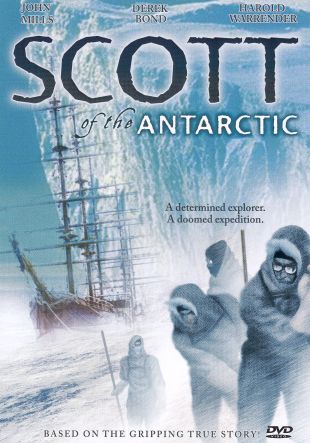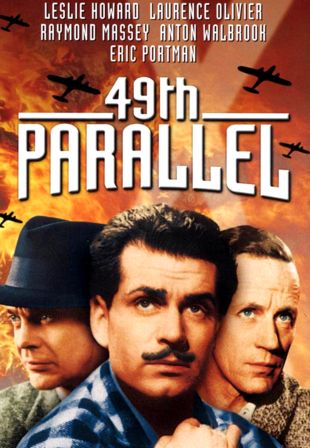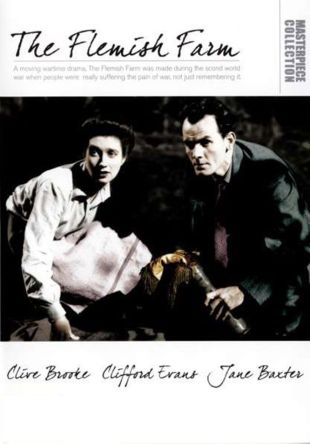Chronology alone made Ralph Vaughan Williams an unlikely film composer -- born in 1872 in Gloucestershire, he was educated at the Royal College of Music and Cambridge University, and was already an established composer at the outset of the 20th century, as well as a leading figure in the rediscovery of England's rich folk music heritage. By the time of talking pictures' arrival, Vaughan Williams was the most prominent composer in England, with three major symphonies (and a fourth about to be debuted); a brace of major orchestral, operatic, and choral works; and a large body of songs to his credit. It would be another decade before he wrote his first film score, at age 69. Stylistically, Vaughan Williams was a post-romantic; his work was completely tonal in nature and rooted in the forms of the late 19th century. He ultimately wrote nine symphonies, five operas, and dozens of smaller-scale works, many of which were among the most beautiful of their era, often steeped in haunting melody and a level of lyricism that ran completely counter to the prevailing trend toward serialism and atonalism that swept across serious music after the 1920s.
Vaughan Williams was among the very few composers ever to turn toward writing music for movies not out of economic necessity, but purely for the creative challenge and opportunity that the task presented. In Vaughan Williams' case, his initial motivation came out of a feeling of patriotism and a desire to contribute to England's war effort. In 1940, during the early months of World War II, director Michael Powell and screenwriter Emeric Pressburger had conceived of a propaganda film, to be financed by the government, that concentrated on Canada's contribution to the British war effort. The resulting movie, which was eventually acquired by The Rank Organization, was the thriller Forty-Ninth Parallel (1941), starring Laurence Olivier, Leslie Howard, Raymond Massey, and Eric Portman, with music by Ralph Vaughan Williams. The composer received a credit in the movie as large as (and immediately adjacent to) the names of the stars. His presence not only elevated the perceived importance of the movie, but his music gave the film a measure of majesty, depth, and richness that, at moments, transcended Powell's visuals and Pressburger's script. The prelude, heard over the credits and aerial views from across Canada, took on a life of its own in the concert hall and another, quieter piece of scoring evolved into the solo piano work The Lake in the Mountains. Even merely as film music, however, the score played an essential role in the unfolding of the movie and its plot -- the jaunty music accompanying the chase through Winnipeg imparted a lustiness to the background shots of the bustling Canadian city that served as a subtle counterpoint to the isolation of the film's fugitive travelers, escaping Nazis off a sunken U-boat. All concerned were delighted with the results of his work, and Vaughan Williams subsequently wrote the music for the wartime drama The Flemish Farm (1943) and the documentary Coastal Command (1942).
Vaughan Williams' film work didn't end with the war, but continued with such dramatic movies as The Loves of Joanna Godden (1947) and Scott of the Antarctic (1948), both made at Ealing Studios and both directed by Charles Frend and produced by Sidney Cole. On both movies, Vaughan Williams felt compelled to begin composing based on the script and the rushes, rather than the final cut of each film, which is the way film soundtracks are normally written. This unorthodox approach by the composer was kept secret by Ealing's music director, conductor Ernest Irving (a good friend of Vaughan Williams'), from the movie's director and the studio, and Irving took responsibility for fitting the music to the movies. In any event, no one ever complained about the final results. The composer later recalled that writing music for The Loves of Joanna Godden did confront him with a problem that no composer before him, to his knowledge, ever faced, and that no training could have addressed -- how to compose music depicting an outbreak of anthrax. And Scott of the Antarctic proved to be a vastly important project, its subject stimulating Vaughan Williams far beyond the boundaries of the film assignment. He ended up using that music as the jumping off point for the seventh of his symphonies, the "Sinfonia Antartica" (using the Italian spelling), which he dedicated to Ernest Irving.
In 1949, Vaughan Williams not only scored but also narrated the ten-minute documentary Dim Little Island, directed by Humphrey Jennings, and the following year contributed some music to Ralph Smart's Australian outback drama Bitter Springs. Vaughan Williams' film work slackened off in the 1950s as he entered his eighties, though he did deliver one last body of soundtrack music, for the documentary The England of Elizabeth, in 1957, the year before his death, a period in which he was also engaged in composing and revising his Symphony No. 9. In the decades since his death in 1958, Vaughan Williams has achieved even greater respect and recognition than he had in his lifetime. During the 1970s, audiences outside of England began discovering such delightful works as The Lark Ascending for solo violin and orchestra, while his symphonies, once embraced almost exclusively by British conductors such as Sir Adrian Boult (who recorded all nine of them twice) and Sir John Barbirolli, have now been recorded in complete cycles by many of the most prominent conductors in the world, including Andre Previn, Bernard Haitink, and Leonard Slatkin. His operas, complete chamber music, and virtually all of his orchestral and choral music have been recorded as well, often many times over.
Vaughan Williams' film scores have been recorded both as suites and, more recently, in their entirety under the auspices of Chandos Records under conductor Ruman Gamba; additionally, one filmmaker, Richard Horian, used Vaughan Williams' music as virtually the entire audio content of his 1998 fantasy feature Williamstowne. His music has also turned up on various television production and in movies. As early as 1936, his masque Job was presented in a British television broadcast. On American television up through the 1960s, Vaughan Williams' music showed up in various uncredited (and also often unauthorized) uses; excerpts of the Symphony No. 6 could be heard in the 1951 Tales of Tomorrow episode "Appointment on Mars," and parts of the "Sinfonia Antartica," were used, unauthorized, in an episode of Land of the Giants, "A Place Called Earth." The latter also was used, fully authorized, in a 1980s television film account of the Royal Air Force's night bombings of Germany during World War II, and his Fantasia on a Theme of Thomas Tallis -- one of Vaughan Williams' most popular works -- appeared in a popcorn commercial of the early '90s and, more recently, in Master and Commander: The Far Side of the World (2003). His music was also used in Far From the Madding Crowd (1967) and Clouds of Glory: The Rime of the Ancient Mariner (1978), among numerous earlier features.


